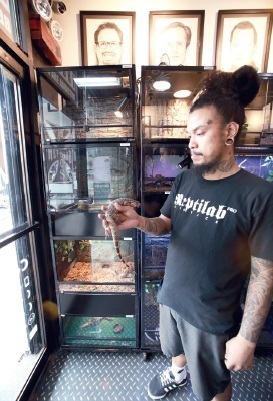Almost all of the pet events I have been to shine a spotlight on adorable and cuddly dogs and cats. Visitors would go directly to them without hesitation to pat them lovingly on their heads or rub them on their soft bellies.
These events give guests the opportunity not only to bond with animals, but also to give importance to the welfare of other animals, like birds, fishes, and reptiles.

I did a simple survey and asked 10 animal lovers what their least favorite kind of animal was. Six of them quickly replied, “Reptiles.” I wondered, how did these beautiful vertebrates get such a bad reputation?
In several public forums online dedicated to reptile keeping, many people think that reptiles are dangerous animals because of their hard scales, sharp claws, and pointy teeth.
Animal Scene talked to Reptilab owner and reptile enthusiast Eugene Conrad to debunk the most common reptile myths.
Reptile love
For those thinking about having a reptile companion, Conrad offers Reptilab, a one-stop shop that caters to both beginners and advanced reptile caretakers.
Reptilab’s started in early 2018, and in only a year, opened two more stores in Cartimar – Reptilab Exotics for curious newbies, and Reptilab Pro for seasoned caretakers.
“True to the principles of Tortoise University, Reptilab seeks to inform and educate its customers first, instead of up-selling for the sake of revenue,” Conrad tells Animal Scene. Tortoise University is a Facebook page he created to help beginners with their companion tortoises.
“[The Reptilab team] works as one to create the best possible experience when customers enter our shop,” he adds. All the animals in their store have legal documentation, as they work very closely with the Department of Environment and Natural Resources.
Their animals are all healthy and in such cases where they get sick, they make sure to nurse them back to health regardless of the cost. “Since we are all hobbyists, we abide by the principle of ‘If I wouldn’t buy it, why will I offer it to my customers?” Therefore, I am confident, given our strict quality standards, that all Reptilab animals are in [their] best condition,” Conrad says.
When it comes to their products, Conrad says they only offer brands that have been tried and tested. He especially recommends the brands ZooMed and Komodo.
“ZooMed is not only well designed, but through their vast product assortment and colorful packaging is also an attractive choice to newbies and advanced hobbyists,” he explains. “Komodo is another brand of reptile accessories from the UK. Besides ZooMed, I’d choose Komodo to take care of all my reptile needs.”
Reptile-ready?

When choosing the kind of reptile whom you would like to share your home with, always take into account the size of your home, their needs and requirements, and weigh the pros and cons of caring for one.
Size matters
When choosing the kind of reptile whom you would like to share your home with, always take into account the size of your home, their needs and requirements, and weigh the pros and cons of caring for one.
Reptiles can be low maintenance
You can leave them alone in a vivarium or tank, depending on the species – just make sure to keep it clean at all times to avoid any bad smell or molds.
Reptiles are hypoallergenic
Reptiles are ideal companions for animal lovers who have allergies to fur or dust mites.
They require less frequent feeding
Reptiles have slower metabolism, which means they can be fed once a day, twice a week, or even just a couple of times a month depending on the species.
They can live longer than the average animal companion
Jonathan, the oldest giant tortoise in the world, is 188 years old! Because they have long lifespans, you have to be ready to commit to their care for their entire lifetime, and make sure to allow for provisions, in case they outlive you!
Are reptiles dangerous?
One of the most common myths about reptiles is that they can and will kill humans on sight. In reality, it is very rare for any reptile species to harm humans. Snakes, for example, will only “attack” when they feel threatened or scared.
Another possible reason could be poor husbandry and handling.
“Our job is to make so-called ‘misunderstood animals’ in society, such as reptiles, be more accepted by the public, thus educating them and raising awareness about the need to conserve our own local wildlife,” Conrad says.
Many believe that reptiles are dangerous because they are venomous, but online resource page Reptile Knowledge argues that there are less than two percent of reptiles that are actually harmful to animals.
This appeared in Animal Scene magazine’s September to October 2020 issue.
You might want to read:
– Got my eye on you: All eyes on the monocled cobra
– Reality check: Wildlife is wildly decreasing
– A snake in the house: Removing your slinky visitor safely






